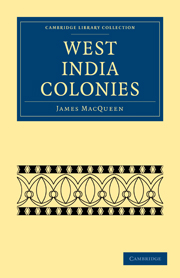Summary
MR. Clarkson as a “fifth Case” turns to St. Domingo, where he asserts that great bodies of negroes were emancipated suddenly, without danger, and with the happiest effect. It is difficult to compress within moderate bounds Mr. Clarkson's statements on this head, in which historical facts are withheld, and more distorted and violated than ever was in any previous case attempted by human ingenuity. That I may not be accused of mis-statement, I shall endeavour to condense in a note the points brought forward by Mr. Clarkson as requiring and being most deserving of notice. To these the reader is referred for a view of Mr. Clarkson's assertions and hardy averments.
In substance Mr. Clarkson's statements amount to this, namely, that the quarrels between the French royalists and republicans—the whites and the mulattoes, was the sole cause of the miseries of St. Domingo—that the negroes did not emancipate themselves, but were emancipated “at once and in a single day” by order of the French Government, and without danger or disturbance, for they continued to labour upon the properties on which the proprietors “lived peaceably, without interruption or disturbance” till the invasion by the French in 1802, under Leclerc, the brother-in-law of Buonaparte,—“till that time the Planters had retained their property, and then it was, but not till then, they lost their all.” p. 24, 26.
- Type
- Chapter
- Information
- West India Colonies , pp. 176 - 209Publisher: Cambridge University PressPrint publication year: 2010First published in: 1824



